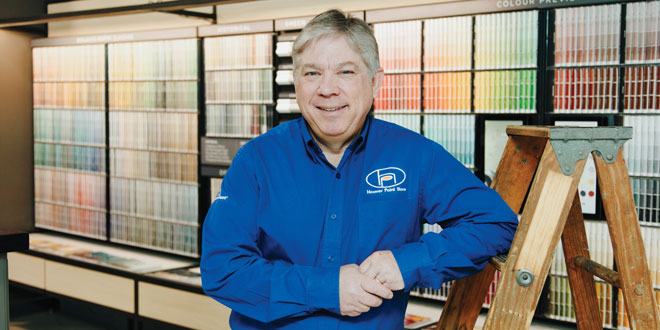Strong leadership is a vital component of a prosperous business because it provides an operation with direction and purpose while cultivating a positive, productive work culture. There are many ways to build and improve leadership in a company; successful strategies require meaningful investments in employees and take your team and business to the next level.
Hardware Retailing spoke with the owner of Hoover Paint and the director of organizational development and consulting for the North American Hardware and Paint Association (NHPA) to gain insight into leadership development strategies.
Leading Others Into Leadership
Tim Bowling, owner of Hoover Paint, which has eight locations near Nashville, Tennessee, realized the need for strong leadership in a company early in his life. Bowling watched his parents spend many hours running Hoover Paint, with most of the duties falling on their shoulders.
“I realized early on that if I didn’t want to do everything myself and have every little thing depend on me, I would need to focus on hiring quality employees who could be developed into leaders,” Bowling says.
As the business grew, the need for focused leadership development became more apparent. Bowling’s store managers had always had a lot of freedom, but more structure was required for them to succeed as a company.
“Once we added our fourth location in 2004, it became more critical to implement a system that would keep us all moving forward in the same direction,” Bowling says. “It was a pivotal point where I realized that we needed to start getting more organized.”
Superb Strategies
For Bowling, developing leaders starts at the ground level. Most of Hoover Paint’s managers started with the company as counter staff and were hired because they naturally possessed the businesses’ core values, Bowling says.
Those core values boil down to one golden rule.
“We endeavor to treat people the way we want to be treated,” Bowling says. “This applies inward, between our staff, and outward, to our customers. We strive to always provide honest answers and proper solutions.”
The second component of quality leadership is an open line of communication between Bowling and his team.
“I maintain an open-door policy, so my leadership team is comfortable asking questions,” Bowling says. “I am always willing to listen to others and make changes as needed. I also make an effort to explain any decision I make so that everybody understands and learns from it.”
Creating a free and innovative work culture is also an important aspect of Bowling’s leadership development strategy.
“I give my employees the freedom to make their own decisions without worrying about me micromanaging them,” Bowling says. “They won’t always make the decision I would make, but we try to learn from our mistakes and our victories to push our operating bar higher. When employees are not afraid of making the wrong choice, they will excel because they are not working in a constant state of fear.”
Bowling employs a standard operating procedure, a collection of written and documented processes, to guide his employees in leadership positions and keep everyone on the same page. He also holds an annual two-day leadership meeting with his sales managers, office managers and store managers.
During these meetings, they review their core values and market niche and then dissect the prior year, address any issues and set plans for the coming year, Bowling says.
Smaller conversations occur more regularly between Bowling and his store managers and sales representatives. Once a month, he hosts meetings to keep everyone updated and moving in the same direction, Bowling says.
The third step is creating an environment where leaders are always learning.
“We aim to teach our leaders basic business principles and the technical product knowledge necessary to succeed,” Bowling says. “We do this by taking our managers to outside events like buying group shows and supplier markets.”
Like Galbreath at Delta Lumber, Bowling is no stranger to bringing in outside experts to develop his staff, and he has occasionally brought in guest presenters to speak on topics like operations, customer service and sales. Bowling also makes an effort to introduce his leadership team to other successful retailers, both inside and outside of their industry. During their meetings, they consider why these retailers are excelling and what can be learned from them, Bowling says.
Growth Through Development
Strong leaders do not always overtly show their success. Leadership skills are often displayed in subtle situations.
“I see leadership prevail in little ways,” Bowling says. “It could be offering extra time off to an employee going through a difficult time or a sales representative taking the initiative to drive two hours to retrieve a specific gallon of paint for a customer.”
Providing advancement opportunities has allowed staff to grow and develop and still remain an integral part of the company’s growth. When Hoover Paint had an employee who had developed to the point that he was ready to run his own store, a third location was added, and he was given that opportunity to grow with the company, Bowling says.
These opportunities for leaders within the company have aided in the expansion of the business and helps the eight-store operation run smoothly today.
“At the end of the day, offering leadership development has led to my employees taking initiative in the business,” Bowling says. “I try to have leaders with unique abilities who can do a better job than me in certain areas. I want to be surrounded by intelligent people who make our team better together than we would be if we were separate. When those are the people taking initiative in the business, everyone wins.”

Hear from NHPA Consultant Kim Peffley
Hardware Retailing spoke with Kim Peffley, the director of organizational development and consulting for the North American Hardware and Paint Association (NHPA), about her industry experience, consultant offerings and leadership insight.
Hardware Retailing (HR): What is your background and experience in the home improvement industry?
Kim Peffley (KP): Before I began working with NHPA, I worked for 25-plus years in the home improvement industry. My career started when my parents built a True Value store. I began as a part-time cashier working nights and weekends and then worked my way up through my parent’s store to management. When we sold our business to a family-owned group of Ace Hardware stores, I was invited to stay on board. I managed several locations and I ultimately became the general manager. I worked in all areas of the business, including frontline and manager development, merchandising, marketing and new store acquisitions, conversions and remodels. During that time, I worked with a consultant and completed the Vision Process. Through that, I became interested in DiSC personality assessments, and I eventually became an Everything DiSC®-certified facilitator.
HR: What’s involved with the DiSC personality assessment?
KP: DiSC is the leading personal assessment tool to understand and improve work productivity, teamwork and communication in your business. DiSC is a powerful tool that tells you more about who you are as an individual so that you can be more self-aware. It can also be used to improve communication ability, reduce conflict and ensure that you are taking full advantage of the strengths and opportunities of everyone on your team because we are all uniquely different.
HR: What are the benefits of using a consultant?
KP: A consultant is going to customize the experience to your business 100 percent. I can address your specific needs using my experience, as well as the experience of NHPA and the network of people we work with. It isn’t a cookie-cutter program—it truly focuses on you and your business. Additionally, a lot of people tell me, “I am paying you to hold me accountable.” When you run an independent business, managers and owners are at the top and can hold their teams accountable, but there are very few people holding them accountable. Working with a consultant provides direct, honest feedback, and if changes are made and operations are implemented, I can help hold you accountable.
HR: What types of consulting programs does NHPA offer?
KP: We offer Vision Process, Team Builder and hourly consulting at NHPA. Vision Process is a year-long program that includes four store visits and phases meant to strengthen your team, improve communication, define company values and goals and build processes and best practices that fit your objectives. TeamBuilder is a comprehensive two-day analysis of the people side of your business. It fully analyzes your current organizational structure and the way your staff members interact. Hourly consulting is a chance for retailers to run ideas past me or ask for advice on any issues. These meetings are set up virtually, and retailers can decide how many sessions they want and how often they want to do them.
HR: What makes someone a good leader?
KP: I think you have to be able and willing to communicate effectively. That means you need to be able to listen, adapt and adjust depending on who you are talking to. I think you need to be humble and honest and admit that as a leader, you are human. People think that because they are in charge, they can’t make mistakes. The reality is that no one is perfect; mistakes should be looked at as an opportunity to learn new things. I also think a really strong leader has to be completely aware of who their team is. Leaders need to be open to learning new things and able to support and give their team all the development tools they need and the time to do it. When leaders don’t micromanage and allow their team to run with their ideas, it allows for creativity to come up the pipeline.
 Hardware Retailing The Industry's Source for Insights and Information
Hardware Retailing The Industry's Source for Insights and Information






